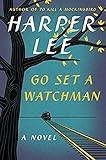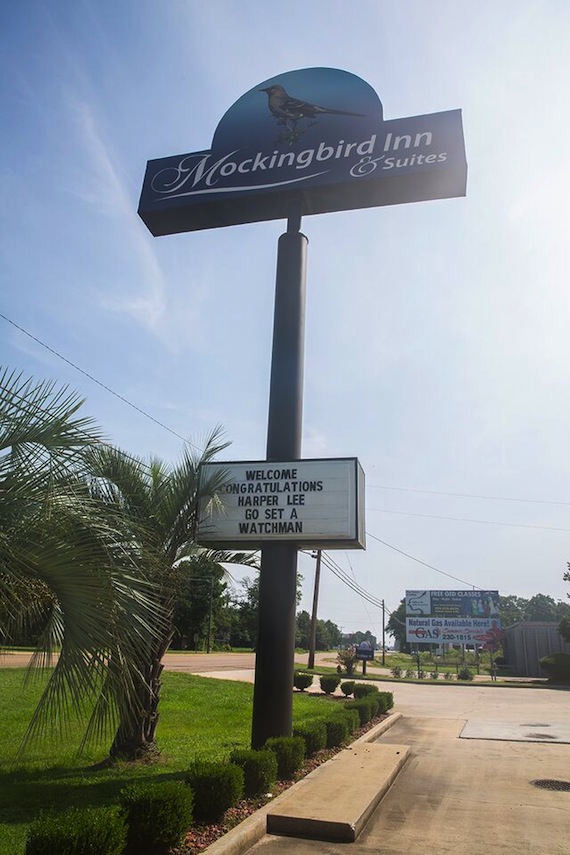
It’s summertime in Harper Lee’s hometown, the inspiration for the setting of To Kill a Mockingbird. Summertime at midnight, and light from the dome atop the proud courthouse beams high above the storefronts facing the downtown square. Summertime, and two blocks away a string of lights runs from the front porch of Ol’ Curiosities & Book Shoppe to a lamppost near the street, emitting a soft glow over 400 or so people gathered in the sweltering heat to celebrate the arrival of Miss Lee’s second novel, Go Set a Watchman. It’s summertime, and the literary event of the year is right here in Monroeville, Ala.

 To Kill a Mockingbird introduced me to a world I already knew. Other books I’d read as a child lured me away from the soulless and repressive place I lived in. I imagined floating off to a magical land full of mythical creatures or maybe a slightly less spectacular world where a cool, resourceful detective inspects the scene of a crime in search of clues. Nothing worth writing about happened in a small town like mine, or so I believed.
To Kill a Mockingbird introduced me to a world I already knew. Other books I’d read as a child lured me away from the soulless and repressive place I lived in. I imagined floating off to a magical land full of mythical creatures or maybe a slightly less spectacular world where a cool, resourceful detective inspects the scene of a crime in search of clues. Nothing worth writing about happened in a small town like mine, or so I believed.
I wasn’t old enough to understand the politics of race or anything regarding rape when I first crossed paths with the Finches, the Radleys, and the rest of Maycomb, Ala. To be honest, I wasn’t quite clear on the meaning of the word chiffarobe, nor did I altogether grasp how to bust one up. Those lessons came later. Still, I was taught a good book shouldn’t instruct so much as inspire.
I took to Scout immediately because she could say anything, without bowing to authority or status quo. As in Maycomb, young people in my hometown dwelled near the bottom of the barrel as far as art, music, and books were concerned. I shared Scout’s frustration with her fellow classmates and teachers like Miss Caroline who “seemed unaware that the ragged, denim-shirted and floursack-skirted first grade, most of whom had chopped cotton and fed hogs from the time they were able to walk, were immune to imaginative literature.” Scout spoke my tongue, sized up my home turf, yet somehow bent the familiar toward a richly imaginative — not to mention comical — purpose.

And so, for the release of Miss Lee’s long-lost novel, I lit out on a literary pilgrimage. Upon arriving in Monroeville, I checked in at the Mockingbird Inn & Suites, which exuded the quaint appeal of your standard suburban strip mall. I asked the clerk behind the counter for her thoughts on the new book. “I’m embarrassed to admit I just finished To Kill a Mockingbird for the first time,” she explained. Her co-worker, thumbing through a filing cabinet, leaned over and barked, “I’m not gonna read it — I don’t read fiction books!”
I snagged a schedule of events for the following day’s affairs about town before cutting out. A marathon reading inside the courthouse kicked off at nine. What grabbed my attention, more than anything else, was the midnight release at Ol’ Curiosities & Book Shoppe.
 On the way to the square, located in what several street signs assured me was a “historic” downtown area, a freshly coated billboard displayed the Go Set a Watchman cover with “Thank you, Miss Lee! Welcome Visitors” scribbled across the top. Although the square is no longer a hub of commercial activity, the old courthouse — now converted into a museum — retains the majestic beauty moviegoers will recall from the 1962 adaptation of Mockingbird. I caught a glimpse of what looked like a bespectacled Atticus, decked out in white seersucker, lingering on the courthouse lawn. (Should the dubious reader roll his eyes here, so be it.)
On the way to the square, located in what several street signs assured me was a “historic” downtown area, a freshly coated billboard displayed the Go Set a Watchman cover with “Thank you, Miss Lee! Welcome Visitors” scribbled across the top. Although the square is no longer a hub of commercial activity, the old courthouse — now converted into a museum — retains the majestic beauty moviegoers will recall from the 1962 adaptation of Mockingbird. I caught a glimpse of what looked like a bespectacled Atticus, decked out in white seersucker, lingering on the courthouse lawn. (Should the dubious reader roll his eyes here, so be it.)

My endless quest for the ideal independent bookstore borders on an unhealthy, Ahab-level obsession. I turned up as a forklift unloaded three shrink-wrapped pallets stacked with boxes. Inside the phone rang without end as I browsed the shelves. By noon, Spencer Madrie and his staff, which includes his mother, counted 7,500 orders. “As soon as all this is over, I’ll get a cup of coffee and find a cozy corner to read it,” he told me. “We have 5,000 books to ship out. I’m holding out on reading it until I mail a book to every customer.” Each copy contains a certificate of authenticity and a seal with the store logo embossed on the front flyleaf. I checked my bank account before settling up.
The countdown to midnight exceeded all expectations. News trucks from Birmingham, Mobile, Pensacola, as well as major outlets like CNN, jockeyed for curb space along West Claiborne Street. Reporters flanked the throng of Lee enthusiasts, requesting interviews. Mr. Madrie, dressed in his Sunday best and seeming genuinely surprised at the sizable turnout, welcomed the crowd and thanked them for coming. Roughly half were out-of-towners looking to score a copy of a book that’s available online or at every airport in the English-speaking world.
Meanwhile, alongside the shop, a tent and chairs offered relief from the soul-crushing humidity. An Atticus impersonator, flown in from Baltimore, posed for selfies. (To hell with you, dismissive reader, and your smug skepticism! It was him, after all!) Champagne corks popped, plates of finger foods were passed around, a squad of little leaguers, still suited up in game jerseys, chased one another through a maze of pesky adults. No wine-and-cheese reception, this was a free-for-all blowout for book-lovers of every stripe.
I mean no disrespect to Mr. Madrie and his exceptional bookstore when I say the true hosts on this occasion were the people of Monroeville. I sensed no resentment toward myself and the other strangers-come-lately who’d crashed their party. What’s more, I was treated like one of them. A mother and daughter kept me in polite company as I stood in line. The daughter was hell-bent on reading the entire novel on no sleep. Her mother and I chatted about the negative reviews printed in The New York Times. “Being from Monroeville, this is a once-in-a-lifetime opportunity,” she said. “There’s been so much back-and-forth about whether or not the book should be published. Now it’s time for everyone to read it and decide for themselves.”
Go Set a Watchman stunned reviewers by constructing an alternate universe where the beloved moral giant of American literature appears as a racist jerk. From these dashed off impressions, you’d assume Atticus Finch is the character central to the plot. The starting point for this strain of critical myopia begins with the Mockingbird film and the decisive role Gregory Peck played in editing the final cut. According to Charles J. Shields’s biography of Lee,
At the time, the film was considered politically liberal because of the attention paid in the screenplay to social justice. Looking back, however, Peck’s insistence that Atticus’s character occupy more of the film’s center injects a heavy dose of white patriarchal values. In a word, Atticus, an educated white male, appears to be the most important person in the film. Everyone else defers to him, humors him, reacts to him, or disagrees with him. As one critic recently noted, the elimination of Scout’s voice-over from most of the film means that the viewer doesn’t see small-town southern society from the perspective of a young female growing up in it.
Never forget, aspiring Scout impersonators, Lee’s treatment of the story, unlike the cinematic version, is told from the point-of-view of a young girl. By the same token, Go Set a Watchman catches up with our scrappy heroine as a 26-year-old exile, returning to the scene of her childhood.
It comes as no surprise that Lee’s second novel doesn’t quite measure up to the achievement of her debut. An ill-formed draft submitted to publishers at J.B. Lippincott in 1957, Watchman underwent a major overhaul after her editor, Tay Hohoff, recommended rewriting it from the perspective of a child. Two years and untold revisions later, Lippincott finally accepted the manuscript — this time bearing the title To Kill a Mockingbird.
What makes the book a fascinating read, nonetheless, is getting to know Scout as an adult. For those of us who take the liberty of reading Mockingbird as an origin story, Watchman points her toward a destination in life. She stares out a window on a moving train in the opening scene. Her homecoming takes place after living in New York for five years. Sparks fly when a city girl feels pressured to settle down in Maycomb County.
Except for the fact Scout’s dropped her nickname, in certain ways, she’s the same “juvenile desperado, hell-raiser extraordinary” we’ve come to know and love. Jean Louise Finch still thumbs her nose at her prudish Aunt Alexandra, and “when confronted with an easy way out, [she] always took the hard way.”
At a glance, even less has changed in Maycomb, where “if you did not want much, there was plenty.” Atticus, we are told, “was seventy-two last month, but Jean Louise always thought of him as hovering somewhere in his middle fifties — she could not remember him being any younger, and he seemed to grow no older.”
The same stagnant air hovers over Jean Louise’s ex-boyfriend, Hank Clinton, whose world stopped turning back in high school. She keeps him at arm’s length, even though he clearly aims to marry her: “She was easy to look at and easy to be with most of the time, but she was in no sense of the word an easy person. She was afflicted with a restlessness of spirit he could not guess at, but he knew she was the one for him. He would protect her; he would marry her.” His intentions are both noble and condescending. Fortunately, Jean Louise brushes him off in a memorable scene after a late-night swim: “When you live in New York, you often have the feeling that New York’s not the world. I mean this: every time I come home I feel like I’m coming back to the world, and when I leave Maycomb it’s like leaving the world. It’s silly. I can’t explain it, and what makes it sillier is that I’d go stark raving living in Maycomb.”
For every strike against Maycomb, there are homespun moments such as the rapport she shares with the owner of an ice cream shop: “Mr. Cunningham, a man of uncompromising rectitude, had given her a pint free of charge for having guessed his name yesterday, one of the tiny things she adored about Maycomb: people remembered their promises.”
But Atticus and Hank, it turns out, are hiding a continuity-shucking secret. The tipping point comes after Jean Louise discovers they are members of the Maycomb County Citizens’ Council. Torn between staying and going, she condemns their actions in what is perhaps the most striking passage in the novel.
Hell is eternal apartness. What had she done that she must spend the rest of her years reaching out with yearning for them, making secret trips to long ago, making no journey to the present? I am their blood and bones, I have dug in this ground, this is my home. But I am not their blood, the ground doesn’t care who digs it, I am a stranger at a cocktail party.
After seeking guidance from her long-winded uncle, Dr. Jack Finch, Jean Louise barges in her father’s office for a final showdown. With the calm demeanor of a seasoned country lawyer, Atticus delivers a chilling argument in favor of white supremacy and scolds his daughter for “talk[ing] like the NAACP.”
I won’t spoil what happens, but let me just say the closing chapter leaves readers to debate the value of origins, and whether or not Jean Louise succeeds in escaping Maycomb. To be fair, her home turf can’t simply be dismissed as a wasteland because her native soil, somehow, nurtured the independent woman we admire. And yet, tales of success told in small towns across the country are so often stories of sons and daughters who have cut those ties and left. In either case, Go Set a Watchman taps into a classic myth that crosses every stage of American literature, from Walt Whitman and Mark Twain to John Steinbeck and Toni Morrison: the story of American migration.
I overslept the next morning after a late night at the bookstore. My thoughts turned to Atticus as I peered over the balcony where Scout, Jem, and Dill joined Maycomb’s black citizens for Tom Robinson’s trial. Below me, an integrated audience met in the courtroom for a marathon reading of Go Set a Watchman, proof that life stops for no one.
I spotted a billboard off the highway advertising Monroeville as “The Literary Capital of Alabama” as I drove north. It’s been many years since I left my hometown with dreams of living closer to the center of literary culture. As I sat down to write about my summer trip to Monroeville, Ala., I couldn’t help wondering if I didn’t exchange wealth for poverty.
Image Credit: John Rea.


